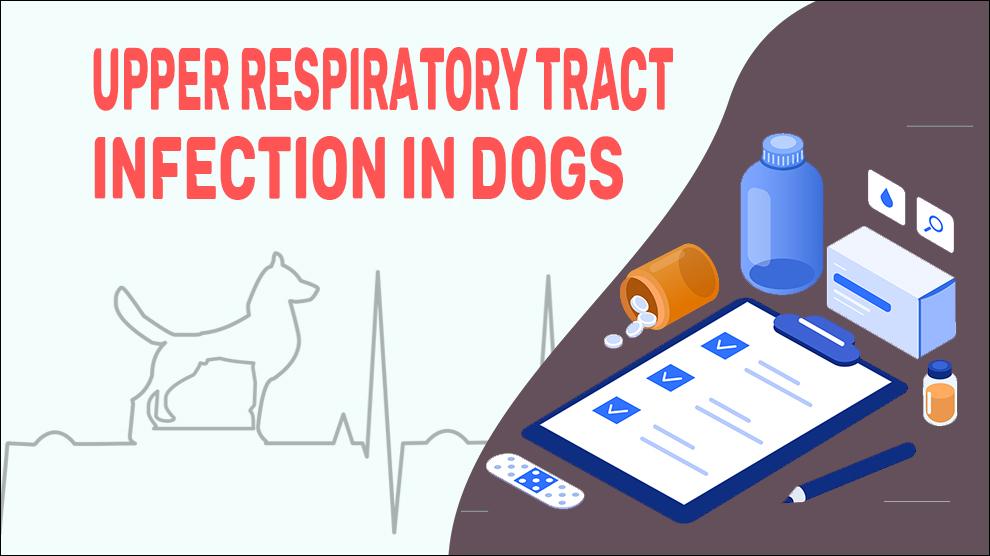What Is Upper Respiratory Tract Infection In Dogs?
Upper respiratory infections in dogs are usually a heterogeneous condition caused by several viruses and bacteria. Some of the upper airway diseases in dogs are infectious respiratory disease complex, kennel cough, laryngotracheitis, and infectious tracheobronchitis (ITB).
Infectious laryngotracheitis (ILT) is an uncommon, highly contagious, and acute infection caused by Canine Adenovirus type 2 (CAV-2). Infectious tracheobronchitis or kennel cough is a multifactorial, highly contagious disease that is caused due to acute or chronic inflammation of the trachea and bronchial airways.
In general, the term ‘Kennel cough’ is an umbrella term for any contagious condition centering on the lungs where one of the major clinical signs is ‘coughing’. ‘Infectious tracheobronchitis’ term suggests the site of the infection is the trachea (or 'windpipe') and bronchial tubes.
ITB is often a result of viral infection of the respiratory system. Typically, it is a mild, self-recovering infection that normally improves on its own. Sometimes, however, in weakened, debilitated, or aged dogs, it can progress to fatal bronchopneumonia (in puppies) and chronic bronchitis. The infection spreads quickly among vulnerable dogs housed in close detention, such as kennels, veterinary hospitals, grooming facilities, or rescue centers.
Symptoms Of Upper Respiratory Tract Infection In Dogs
- Acute onset of dry, harsh cough ('goose honk')
- Rapid/labored breathing
- Wheezing
- Swollen tonsils
- Fever
- Oculonasal discharge
- Loss of appetite
- Dehydration
Severe cases
- Dogs try to clear their throat or spit up or gag, often mistaken as vomiting.
- Bronchopneumonia
- Tachypnea
- Respiratory distress
- Pyrexia
Treatment Options For Upper Respiratory Tract Infection In Dogs
There is no specific treatment available for upper respiratory tract infection in dogs.
- In most cases resolve without any aggressive medications (similar to the Common Cold in humans)
- Typically, your vet treats the symptoms and keeps your dog hydrated while the virus runs its course
- For dehydrated dogs, Intravenous fluids such as 9 percent saline, Lactated ringers, Normosol-R, Plasmalyte, Ringer’s, dextrose, or sugar solutions
- Nutritional therapy such as Beefor chicken broth
- Anti-inflammatory medications: Cyclosporine (Atopica), Cortisone (dexamethasone, prednisone, prednisolone), Azathioprine, leflunomide, and mycophenolate mofetil.
- Broad-spectrum antibiotics such as Amoxicillin, Cephalexin, Chloramphenicol, Clindamycin, Doxycycline, Gentamicin, Metronidazole, and Sulfadimethoxine
- cough suppressants (Dextromethorphan, Butorphanol Benylin, Balminil, Delsym)
Home Remedies For Upper Respiratory Tract Infection In Dogs
- Provide plenty of fresh water during the course of infection o help keep them hydrated.
- Steam treatment for affected dogs is always a good thing to do. Take your dog with you when you are going to have a hot shower in the bathroom.
- Keep the affected dog in isolation and limit the exposure to other dogs, even after they are considered to be recovered for at least a few more weeks.
- The good thing to do is to keep your dog’s hideout sanitary and sterilized.
How To Prevent Upper Respiratory Tract Infection In Dogs?
As there are quite a few risk factors facing your pet with respect to respiratory tract infections, check with your vet about the vaccine shots - it’s vital that your pups get the right vaccines at the right time.
For instance, the bordetella vaccine – Adult dogs every 6- 12 months
Affected Dog Breeds Of Upper Respiratory Tract Infection
Flat-Faced Breeds, French Bulldog, Pug, Toy Dog Breeds, Yorkshire Terrier, Chihuahua. There is no breed disposition.
Causes And Prognosis For Upper Respiratory Tract Infection In Dogs
1. Causes:
Incubation period: 2–8 days (with a range of 2–14)
Transmission:
- Suspended aerosol microdroplets of respiratory secretions.
- The most common cause is Oronasal contact with other dogs or fomites (both porous and nonporous surfaces) and owners. Healthcare professionals (less common)
Bacteria
- Mycoplasmas (Mycoplasma cynos)
- Streptococcus Equi (subspecies zooepidemicus)
- Aerobic coccobacillus (Bordetella bronchiseptica)
Canine Viruses
- Adenovirus 2
- Bocavirus
- Coronavirus (pantropic strain)
- Distemper virus
- Hepacivirus
- Herpesvirus
- Influenza virus
- Parainfluenza virus
- Pneumovirus
- Respiratory coronavirus
- Reovirus
2. Morbidity:
- Canine distemper virus/ Canine influenza virus infection symptoms start off with symptoms similar to Kennel cough
- Signs vary from a slight fever and a loud cough to hemorrhagic viral pneumonia
- Most viruses are cleared in 2 weeks; however, sometimes clinical symptoms may last for even weeks
3. Mortality:
Puppies have the highest mortality rate (usually it ranges < 5%)
- Pneumonia (0.4%)
- Unspecified disease or failure (0.4%)
- Tracheal collapse (0.2%)
- Laryngeal paralysis (0.1%)
- Bronchitis (0.1%)
4. Diagnosis:
- T Complete blood count (CBC), blood chemistry profile
- Urinalysis
- Electrolyte panel
- Antigen test (enzyme immunoassay or EIA)
5. Prognosis:
It is really difficult to predict chances for recovery as the nature and extent of the disease vary greatly for each dog. In general, respiratory tract infections are rarely fatal and will usually be self-limiting. However, medications are typically given to check the condition from aggravating and to help your dog recover faster.
When To See A Vet For Upper Respiratory Tract Infection In Dogs?
Contact your vet right away, if you notice any of the following:
- Acute onset of dry, harsh cough ('goose honk')
- Rapid/labored breathing
- Wheezing
- Swollen tonsils
- Fever
Food Suggestions For Upper Respiratory Tract Infection In Dogs
- Nonmeat/plant protein sources such as potatoes, nuts, lentils, beans, quinoa, chickpeas, soybeans, green peas, etc
- Low-carb, Organic, high-protein, and cruciferous foods
- Cruciferous vegetables, such as Cabbage, collards, broccoli, cauliflower, and kale
- Fresh vegetables/fruit (banana, carrots, green beans, apple, orange)
- Omega 3 fatty acid foods (avocados, flaxseeds, Sardines, salmon, Mackerel, Herring, etc)
- Antioxidant berries such as blueberries, Strawberries
Conclusion
While most cases of upper respiratory tract infections will resolve without treatment, medications may play down symptoms or accelerate recovery during the course of the infection.
When possible exposure to infectious agents cannot be prevented, appropriate vaccination can avoid or reduce the symptoms, reduce the period of the infection and stop the spread.

















